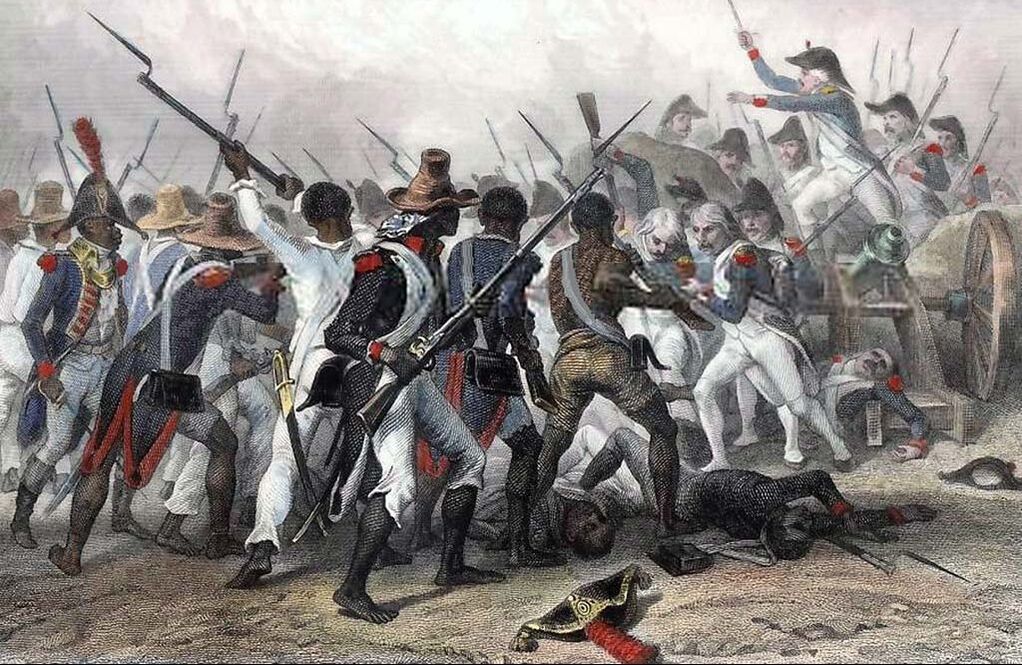
Two hundred years ago today, on April 17, 1825, France imposed an indemnity on Haiti.
Not for war damages. Not for property loss. But for the unthinkable: for winning our freedom.
After defeating Napoleon’s army and becoming the world’s first Black republic, Haiti was forced to compensate its former enslavers. Under threat of French warships, Haiti’s president Jean-Pierre Boyer signed away the nation’s future—150 million francs (later reduced to 90 million)—an astronomical sum equivalent to billions in today’s currency. This debt, which took over a century to repay, was demanded for the “loss” of enslaved human beings and plantations. In this perverse arithmetic, the formerly enslaved were ordered to compensate their tormentors—for daring to reclaim their humanity.
To comprehend the full magnitude of this extortion, we must confront the unspeakable brutality that preceded it.
Slavery in Saint-Domingue was not merely oppression—it was calculated annihilation. The colony that would become Haiti produced 40% of the world’s sugar and 60% of Europe’s coffee, wealth extracted through methodical terror. The average life expectancy of an enslaved person was just 21 years. Bodies collapsed under the relentless labor of sugar cultivation, working from before dawn until after dusk in scorching fields. Resistance brought swift retribution—limbs severed, bodies burned alive, families separated as warning. Women endured systematic sexual violence as both punishment and reproductive control.
Colonial records themselves acknowledge these horrors. As Moreau de Saint-Méry wrote in his 1797 description of the colony, the treatment of the enslaved was marked by “excessive cruelty” that knew “no limits but the fear of losing capital invested in human property.”
Yet in the face of this calculated dehumanization, our ancestors did the impossible—they remembered their humanity.
They preserved their cosmologies through the veil of Catholicism. They communicated in Kreyòl, a language born of resistance. They maintained African agricultural knowledge in their provision grounds. They passed down botanical medicine in whispers. And in the darkness of night, in the sacred spaces of the lakou, the drums spoke of revolution.
The Haitian Revolution was not merely a military victory—it was a fundamental reimagining of what it meant to be human.
When Dessalines declared independence in 1804, he did not simply create a new nation—he challenged the entire global order built on racial hierarchy. Haiti proclaimed that Black lives were not commodities but bearers of the same inalienable rights glorified in the American and French revolutions. This radical assertion was intolerable to colonial powers, who responded with diplomatic isolation, trade embargoes, and finally, the crushing indemnity of 1825.
The consequences were devastating and deliberate. By 1900, 80% of Haiti’s national revenue went to paying foreign debts. Schools went unbuilt. Hospitals remained dreams. Infrastructure crumbled before it could rise. When natural disasters struck, the nation had no reserves to rebuild.
This was not mismanagement. This was planned extraction.
And the pillaging continued long after the indemnity. In 1915, American marines occupied Haiti for 19 years, rewriting its constitution to allow foreign land ownership. During this occupation, as National City Bank of New York (now Citibank) seized control of Haiti’s National Bank, U.S. forces transferred Haiti’s gold reserves—worth approximately $500,000 in 1915 currency—directly to New York. These funds disappeared into American coffers, never to return.
Today, we demand more than acknowledgment. We demand repair.
France must return the modern equivalent of the 90 million francs extorted from Haiti, with interest compounded over two centuries. The United States must account for Haiti’s stolen gold reserves and the economic damage of its occupation. International financial institutions must cancel debts that are the direct descendants of colonial theft.
This is not charity. This is not aid. This is long-overdue restitution.
For two centuries, Haiti has been humiliated and portrayed as a cautionary tale—a warning to other colonized peoples not to dare reach for freedom. Global narratives discuss Haiti’s challenges as though they were inevitable or self-inflicted rather than the direct result of calculated international actions. This deliberate distortion serves a purpose: to obscure colonial culpability and to whisper to oppressed peoples everywhere: “See what happens when you demand your dignity?”
Yet even under this sustained assault, Haiti’s revolutionary spirit has never died. Despite our struggles, Haitians supported Simon Bolívar’s liberation campaigns with soldiers and supplies when he promised to abolish slavery. We sent aid to Greece during their fight for independence. Our constitution inspired liberation movements across Latin America and beyond. Even as we were being strangled by debt, Haiti extended a hand to others seeking freedom.
As a trauma specialist, I must emphasize: Haiti’s present challenges cannot be separated from its historical wounds.
The science of intergenerational trauma teaches us that profound violations like slavery and economic extraction don’t simply disappear with time. They become embedded in social systems, family patterns, and even biological responses. Haiti’s political instability, environmental vulnerability, and economic challenges are the predictable manifestations of historical trauma left unaddressed and continuously reinforced.
As Haiti faces the challenges of climate change, political instability, and economic hardship, we must recognize these not as inherent failures but as the predictable outcomes of centuries of orchestrated extraction and unhealed trauma. When media narratives speak of Haiti’s poverty without mentioning its plunder, they perpetuate the very erasure that enabled such theft.
Today, as we mark two centuries since that unconscionable indemnity was imposed, let us transform remembrance into action. Let us dismantle the narratives that blame Haiti for conditions created by colonial greed. Let us demand accountability from nations and institutions that built their wealth on Haitian suffering.
Share this history. Teach it in your schools. Speak it in your governments. Because a world that allows such theft to go unaddressed cannot claim to value justice or human dignity.
The debt is not Haiti’s to bear—it is the world’s to repay.
